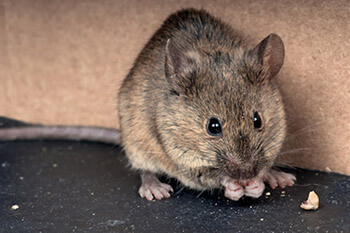Control Rodents in Your Home
Nov 18, 2019

Rats and mice can be a problem just about anywhere you live. They infest old buildings and crowded, unsanitary areas, but they can also be a problem even in newer homes and clean conditions. And, of course, rats and mice have long been a problem on farms where food is plentiful and convenient and nesting sites are both numerous and hard to eliminate.
There are five major problems caused by rats and mice:
1. They eat food and contaminate it with urine and excrement.
2. They gnaw into materials such as paper, books, wood, or upholstery and use them as nest material. They also gnaw plastic, cinder blocks, soft metals such as lead and aluminum, and wiring, which may cause a fire hazard.
3. Rats occasionally bite people and may kill small animals.
4. They — or the parasites they carry such as fleas, mites, and worms — spread diseases.
5. Rats can damage ornamental plants by burrowing among the roots or feeding on new growth or twigs. They also eat some garden vegetables such as corn and squash.
There are two main solutions to solve rodent problems:
1. Traps
2. Poison baits
Traps are often preferred over poison baits for several reasons. Poison baits, carelessly used, can harm children, pets, and non-target animals. Sick rodents may also escape to areas between walls or under floors where they die and decompose, causing odor and insect problems.
There are two main types of traps: snap traps and glue traps. Both types are very effective in taking care of rodent problems and are available at your local Co-op.
Poison baits are mainly composed of compounds called anticoagulants. Their mode of action involves reducing the ability of blood to clot so that exposed animals bleed internally and die. Anticoagulants are cumulative poisons and act relatively slowly; rodents typically die several days after initial and continual feeding on the bait. This slow process is usually necessary to prevent rodents from becoming bait-shy.
Your Co-op offers a variety of poison baits and can help you choose the right one for your home pest control needs. There are several different anticoagulants, but the mode of action is the same.
When using either baits or traps, they need to be placed in areas that are frequented by rodents such as along the base of walls, under cabinets, and in attic crawl spaces.
While colder weather tends to drive rodents indoors, they can be a nuisance all year long. By keeping the traps and/or baits available year-round, you will reduce the number of pests and keep them at bay.
There are five major problems caused by rats and mice:
1. They eat food and contaminate it with urine and excrement.
2. They gnaw into materials such as paper, books, wood, or upholstery and use them as nest material. They also gnaw plastic, cinder blocks, soft metals such as lead and aluminum, and wiring, which may cause a fire hazard.
3. Rats occasionally bite people and may kill small animals.
4. They — or the parasites they carry such as fleas, mites, and worms — spread diseases.
5. Rats can damage ornamental plants by burrowing among the roots or feeding on new growth or twigs. They also eat some garden vegetables such as corn and squash.
There are two main solutions to solve rodent problems:
1. Traps
2. Poison baits
Traps are often preferred over poison baits for several reasons. Poison baits, carelessly used, can harm children, pets, and non-target animals. Sick rodents may also escape to areas between walls or under floors where they die and decompose, causing odor and insect problems.
There are two main types of traps: snap traps and glue traps. Both types are very effective in taking care of rodent problems and are available at your local Co-op.
Poison baits are mainly composed of compounds called anticoagulants. Their mode of action involves reducing the ability of blood to clot so that exposed animals bleed internally and die. Anticoagulants are cumulative poisons and act relatively slowly; rodents typically die several days after initial and continual feeding on the bait. This slow process is usually necessary to prevent rodents from becoming bait-shy.
Your Co-op offers a variety of poison baits and can help you choose the right one for your home pest control needs. There are several different anticoagulants, but the mode of action is the same.
When using either baits or traps, they need to be placed in areas that are frequented by rodents such as along the base of walls, under cabinets, and in attic crawl spaces.
While colder weather tends to drive rodents indoors, they can be a nuisance all year long. By keeping the traps and/or baits available year-round, you will reduce the number of pests and keep them at bay.